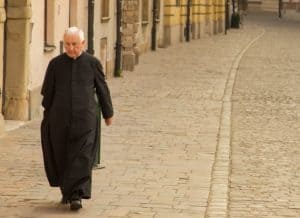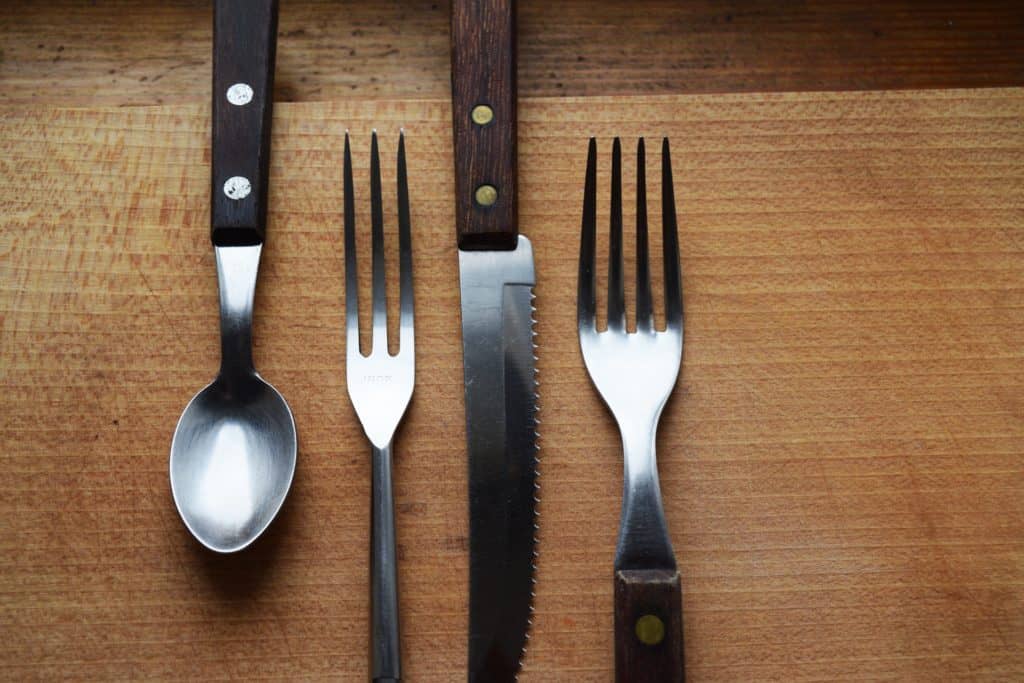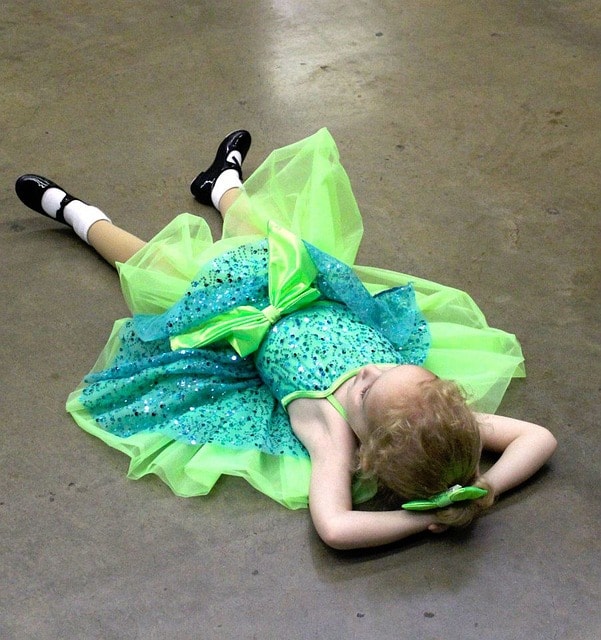Three Hots and a Cot
– Creative Non-Fiction by Elizabeth Christie – March 6, 2018 –
“God, if you want me to be a nun, please don’t tell me about it tonight. Amen.”
Lying on my bed, staring at my popcorn ceiling, these words became my nightly prayer starting at the age of six. For me, a religious calling was something to fear. I could think of nothing worse than becoming a nun. The sisters at my school, although progressive, still wore knee length polyester skirts, white button up shirts, cardigan sweaters and brown orthopedic shoes. I also heard they ate gross dinners of stews and cheap hot dogs and shared rooms in a house where the curtains to the carpet were brown, old and worn. To top it all off, they went to Church twice a day and prayed regularly. For a child who needed everything to be loud and drenched in glitter, this path was less appealing than a career as a professional punching bag.
Unlike me, a holy vocation was a luxurious proposition in my father’s eyes. He would tell me almost daily how he knew he would be a priest when the siren’s call of “three hots and a cot” was too strong for him to deny.
 His call came in high school. A priest from the Divine Word Seminary came to his classroom to recruit children to the vow of poverty, chastity, and obedience. My dad had the poverty part down. He thought he could maybe give the chastity and obedience part a go, too. One question, however, weighed heavily on his mind before he could take that giant leap of faith.
His call came in high school. A priest from the Divine Word Seminary came to his classroom to recruit children to the vow of poverty, chastity, and obedience. My dad had the poverty part down. He thought he could maybe give the chastity and obedience part a go, too. One question, however, weighed heavily on his mind before he could take that giant leap of faith.
He raised one of his thick hands in the air, weathered from years of schoolyard fights and shoe shining in the bitter, New York cold.
“How many meals do you get a day?” my dad asked.
The priest sighed. “Three,” he replied, rubbing his temples.
Apparently, joining the priesthood was de rigueur in the 1940’s specifically because poor kids had craftily discovered the loophole that the priests had to feed them. This priest was tired of answering questions about the food exclusively. He must’ve longed for the days when people questioned their eternal salvation and thought about how holy orders would deepen their connection to God.
My dad gave two shits about going to heaven. He was so poor and hungry that he’d resort to stealing sausages off Jack Dempsey’s plate. Jack was a regular at the Manhattan restaurant where my dad bussed tables. If Dad was willing to risk a beating from a heavy weight for a sausage, he’d risk his freedom entirely for a full plate.
He’d heard all he needed to hear from the priest. A big grin spread across his chubby face revealing his naturally perfect, straight teeth.
“Sign me up,” he said with a charming smiling and an endearing chuckle.
A week later, he and his few belongings (including a flashlight that he’d bought himself the Christmas before–the only present he received that year) headed off to live out the rest of his days serving the Lord. He arrived at the Divine Word Seminary full of hope and surrounded by countless young men, all of whom were as hungry as he. Only a handful of them were actually starving for God’s grace. The rest just wanted in on the hot porridge and steaks the priests wouldn’t shut up about at the recruiting sessions. The seminary was indeed heaven on Earth.
My dad woke up every morning to abundance and went to sleep with a full belly and a few extra Latin words rolling around in his heads that he would later break out as party tricks or icebreakers. The first few days were like an all-expense-paid vacation to the beach until the vow of silence became a roar in his head. He struggled to stay quiet, but he couldn’t resist speaking the wisecracks and platitudes that rolled around in his head. His fists were also itching to fight. It became physically painful not to talk.
One day, my dad looked up towards the heavens and wondered if he’d made the right decision. Why would God give him the Irish gift of gab only to tell him to be quiet? He could think of no good reason, so he packed up his flashlight and turned his back on a lifetime of three square meals. The only thing that could trump his stomach’s desires was his silver tongue.
In lieu of a priestly existence, my father realized his calling was to be Christ-adjacent. He did everything he could to emulate the facts of Jesus’s life without the good deeds and piety. My childhood home in Chula Vista became a sort of church in so far as there were daily prayers, a central charismatic figure, and a modest sized congregation comprised solely of my mom, my eleven siblings, and me.
My father was, of course, the central deity. He would yell “I AM GOD” and add “of this house” in a whisper, lest the real God be listening in on our conversations. My mother was his Mary; whether she was the Virgin Mary or Mary Magdalene was all contingent on his moods. Since he had twelve children, he also had built-in disciples, though there was not necessarily any dogma to this church, unless you count the irrational whims of my father.
The church of Frank McKenna was a humble one where single donuts were split twelve ways, and the hot water was only turned on once a week for our Saturday night bath. Fistfights between disciples’ over use of the phone or the last Hostess cupcake happened daily. All told, it was an exceptionally corrupt church. We, the disciples, really did try our best, though.
With any good church, there were holy rituals and obligations with no dispensations. Every night, each member of my family had to be home precisely at six to eat dinner with our brethren. It’s where we scrambled to shove as much food in our faces before someone else stuck a fork in our chicken (or hand, depending on how frenzied the eating was) and ate it in one large bite.
The eating ritual was methodical. The clock struck six. The heavy copper bell that my mom kept above the sink came down, and the youngest family member (me) would tear through the house yelling “suppertime, suppertime, suppertime.” I was much like an altar boy carrying the incense chain censer at the end of mass, except I was louder and spread discord as opposed to harmony.
 All disciples who still lived in the house would rush to the table, knowing full well the magnitude of the wrath that would meet us if we didn’t show up right on time. Anyone who made my father wait a moment longer to satiate his hunger would receive an evil stare, a beating, or both. Everyone tried to blend in with the brown benches or operate off the radar at these meals since dinnertime was prime-time for lectures and rehashed stories about Dad’s impoverished childhood or his destroyed left foot. It was best to avoid eye contact. At the end of the meals, we’d rush to get the dishes off the table. The oldest kids grabbed the plates, the middle kids grabbed the cups, and the youngest kid (me) would grab the utensils. These were the rituals of our nightly “Mass.”
All disciples who still lived in the house would rush to the table, knowing full well the magnitude of the wrath that would meet us if we didn’t show up right on time. Anyone who made my father wait a moment longer to satiate his hunger would receive an evil stare, a beating, or both. Everyone tried to blend in with the brown benches or operate off the radar at these meals since dinnertime was prime-time for lectures and rehashed stories about Dad’s impoverished childhood or his destroyed left foot. It was best to avoid eye contact. At the end of the meals, we’d rush to get the dishes off the table. The oldest kids grabbed the plates, the middle kids grabbed the cups, and the youngest kid (me) would grab the utensils. These were the rituals of our nightly “Mass.”
After “Mass” one night, we even performed a pantomime of my dad’s crucifixion. As we cleaned the table, he went into the garage and came back with a termite-ridden beam that flaked off across the dining room floor. He pulled off his white undershirt, exposing a flabby, pale back covered in zits and back hair.
“Come on, kiddy kid kids,” he said as he hoisted the wood onto his meaty shoulders, putting him at risk for both splinters and tetanus. He grunted from the effort. We then stood around him pelting insults to simulate the original crucifixion.
“Traitor, heretic, evil,” we shouted at him as he grunted his way through the dining room. Had we had any rocks, we would’ve showered him with them (in the name of art, of course).
“You’re persecuting me,” he moaned at our words and continued to walk through to the living room. I don’t know which of us was Judas, a figure he’d be keen on including in the reenactment. Maybe we all were. We ran to him and wiped his face like Veronica, which resulted in rags covered in an image of our dad from the butter that coated his face from dinner.
After a few minutes, the crucifixion was over. We stopped just short of nailing him to the cross. Perhaps this was because we lacked the complete cross and stakes to hold him in place. Most likely it’s because my dad never intended to follow through with the execution. He was only interested in the drama of the journey.
He even reimagined the New Testament and flipped the whole “Jesus-washed-peoples-feet-to-show-humility” scenario on its head. He was above the feet washing. Instead, he involved my four brothers in a bizarre ritual whenever one of them went off to college. The brother who was immediately younger to the one leaving would have to wash the older one’s feet. Patrick, the youngest, paid his dues, but never had the feet washing reciprocated. Come to think of it, maybe he was the Judas in our family.
My dad found his calling by way of the enticement of three square meals. He didn’t end up a direct servant of the Catholic God, but I like to feel like our childhood home was Catholic Church adjacent, which wouldn’t have happened without his pit stop at the seminary.
But I had no clue what my calling would look like, and the thought of the possibilities made me break out in cold sweats the minute my dad turned off my light each night. In my worst nightmares, the calling was unexpected, spooky, and probably involved a dead relative (three things I wanted nothing to do with).
 Sometimes I imagined it might be sweet. I knew what beatific visions were and perhaps those weren’t half bad. I once had a dream about a pink poodle that was effervescent and gorgeous that I suspect might qualify as beatific. We ran up and down city streets, her fluffy hair bouncing in the wind. She was mine, and I was the envy of the town. I woke up feeling renewed and put a placeholder in my mind so I could return to that dream. But, when I fell asleep that evening, the pink poodle was nowhere to be seen. I felt God failed me that night. I also couldn’t find any correlation between that dream and God, so I decided that wasn’t him beckoning me to become a nun.
Sometimes I imagined it might be sweet. I knew what beatific visions were and perhaps those weren’t half bad. I once had a dream about a pink poodle that was effervescent and gorgeous that I suspect might qualify as beatific. We ran up and down city streets, her fluffy hair bouncing in the wind. She was mine, and I was the envy of the town. I woke up feeling renewed and put a placeholder in my mind so I could return to that dream. But, when I fell asleep that evening, the pink poodle was nowhere to be seen. I felt God failed me that night. I also couldn’t find any correlation between that dream and God, so I decided that wasn’t him beckoning me to become a nun.
Maybe my calling would be a quiet “ready or not, here I come,” whispered in my ear. Would a miniature Jesus Christ tap dance his way down a morning sunbeam streaming through my window and give me a knowing smile?
Worst-case scenario, I would learn on my deathbed that God had been dropping subtle hints for years and that I’d effectively barred myself from heaven for being so obtuse.
I decided the most likely scenario was that Jesus would appear to me some night and say, “Pssst, Elizabeth. Pssst. I’ve got some wonderful news! Pack your bags; you’re moving to the nunnery!” With a doff of his crown of thorns, he’d tiptoe back up the beam to punish the next Catholic without giving me time to ask any of the serious questions burning in my heart, such as, “am I allowed to say no?”
I only really wanted to know what a calling looked like so I could avoid it at all costs. After years of perfunctory research spanning from early childhood to late adolescence, I found that non-saint callings were pretty dull. For some, it was a warm calm that washed over their hearts as they contemplated the stations-of-the-cross. They saw the wound in their Lord and Savior’s side and realized they wanted to do for the world what Christ did on that cross. Others recognized their calling through close attention to scripture and a tug in their souls that told them to go towards priest or sisterhood. The calling to Holy Service is unique to each person, so it’s hard to know how to dodge that landmine.
To avoid my calling to Holy Orders entirely, I hunted down other hobbies to throw myself into so, should God call for me, I could say, “I’m so sorry, my Lord, I’ve already started doing this other thing. I think it would be terrible if I just gave up on that completely. Don’t you believe in follow-through?”
I was confident I’d found my calling the first time I laced up my new tap shoes when I was six. With a click of my heels, I was hooked. I had a feeling of wholeness and joy that I’d yet to experience in my tiny life when I tapped my way down the tile floors of the department store as my mom passed her card to the salesperson.
 I began tapping furiously in my garage every chance I got. I’d get home from school, throw my backpack on my rainbow covered bed, and put on my tap shoes. Still in my school uniform, I’d make up moves and pound the pavement with my toes and heels. Among the cobwebs, mildewed boxes filled with family photographs, and our washer and dryer, I tapped my way through the afternoon in the hopes of dazzling my teacher, Bobby. My feet would pound to the rhythm of the dryer (since there wasn’t a radio in the garage) while I had visions of my dance teacher telling me to run, not walk, to a Star Search audition. My talent couldn’t be held back any longer.
I began tapping furiously in my garage every chance I got. I’d get home from school, throw my backpack on my rainbow covered bed, and put on my tap shoes. Still in my school uniform, I’d make up moves and pound the pavement with my toes and heels. Among the cobwebs, mildewed boxes filled with family photographs, and our washer and dryer, I tapped my way through the afternoon in the hopes of dazzling my teacher, Bobby. My feet would pound to the rhythm of the dryer (since there wasn’t a radio in the garage) while I had visions of my dance teacher telling me to run, not walk, to a Star Search audition. My talent couldn’t be held back any longer.
Unfortunately, I wasn’t in tap class for more than a few months when I realized that I hadn’t found my path in life.
After an hour of dancing my little heart out in class one Friday afternoon, my Star Search fantasies came to a screeching halt. As I waited for my turn for the solo floor exercise (buffalos across the floor), I spotted my mom, perched on a white folding chair in the corner, uncomfortable and stiff in her high-collared, silk blouse and tan, ankle-length skirt. She looked bored as she stared out the door, watching the sky change from blue to orange. Every few seconds, she fluffed up her tightly permed hair and smoothed out her skirt.
At the end of class that day, as I walked towards her, click-clacking with each step, my dance teacher waived her over.
“We’ll be right back, honey,” she said as she took my mom by her elbow and guided her towards the opposite end of the studio.
With their backs turned, I stepped again onto the dance floor, inching my way towards their side of the room. Heel, toe, heel, toe, heel, toe. With each step, my feet let out a crisp tap like a horse on a cobblestone. This movement got me halfway there.
I looked over at my mom and saw her jaw clenched as she narrowed her eyes at Bobby. I needed swifter motion; I needed to hear the dirt. Turning my back to them, I stretched my arms out in front of me, bent my knees and did loud, disruptive pullbacks. Clang. Clang. Clang. With three movements, I was within a few feet of them, and I could hear their conversation.
I switched to quiet, absent-minded shuffles so I could find out what terrible things my mom and Bobby were saying about me. I looked at myself in the mirror so they wouldn’t suspect I was eavesdropping. I watched my body flex under my floral leotard and purple leggings as my legs kicked forward.
“All of them are pretty chubby,” Bobby said in a hushed tone. “I just don’t think they have the right bodies to be real dancers. Just watch what they eat. That’s all I’m saying.”
Both my feet, and my dreams of becoming a dancer, stopped mid-shuffle. My shoulders slumped, and tears filled my eyes. My mom looked over at me, and her face fell. That was the end of my tap career.
In hindsight, I realized I’d tried to cheat the system. Sure, tapping felt terrific, but did I really think that my knobby knees and klutzy feet were conducive to a life of tap? Not to mention the fact that I couldn’t remember a routine to save my life. I wasn’t meant to be a tap dancer. It was as simple as that. I also really didn’t have a great calling story to match my ambitions to dance, either. The story of “I went to Nordstrom, tried on some tap shoes, and loved the way my feet sounded in them” was insignificant and mundane. It was nothing like my dad’s calling. This should’ve been my first sign.
I’m glad I never pursued tap dancing as a viable career option. First off, I’m sort of lazy when it comes to physical exertion. I hear that professional dancers work multiple hours a day on their skills plus extra workouts in the gym. Except for a several year encounter with exercise bulimia (special thanks to Bobby for her assistance getting me there) that left me with weak knees and an intense fear of pushing myself lest I fall back into old patterns, I have led a relatively sedentary life.
Second, I think the market for tap dancers isn’t as high as it was in the earlier part of the 20th century. I’d most likely have tapped out at a “mediocre” skill level without a plan B to fall back on.
Ultimately, I never did get the calling from God, which is equal parts relieving and insulting. On the one hand, I’m happy I don’t have to live a life of self-abnegation. I apparently enjoy talking about myself too much for that to be feasible. On the other, I don’t know why God doesn’t want me in his club. Sure, I’m an agnostic who has been nothing but skeptical when it comes to the Catholic Church, but that doesn’t mean I’m a terrible person. I could maybe be persuaded if the sisterly accommodations glittered a little more. Also, my standards of what constitutes good eats are higher than my dad’s. I would like to ask for food items better than porridge and rotten beef. Maybe a nice bowl of Poke or a medium rare (is it too much to ask for organic, also?) steak.
It’s not that I’m saying that the answer would be “yes” if a holy calling did come my way at some point. It would just be nice to be asked.
 About the Author
About the Author
Elizabeth Christie is the youngest of twelve kids in an Irish Catholic family. She became the family “writer” after penning her first play entitled “Thanksgiving” at six years old. From there, her career took off. Her writing has appeared in Slice Magazine, Bust Magazine, Radar Online, Chalkboard Magazine, and 34th Parallel. She currently lives in Los Angeles, California with her husband, Greg, and two kids, Darla and Jude. When she’s not managing operations for Papercranes Music, a music editing company, she writes self-disparaging posts on her blog, mothersgilt.com, and essays on her childhood.
Read more non-fiction on Dreamers Creative Writing.